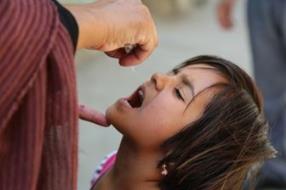 A child receives the oral polio vaccine in Kabul. Photo: WHO/S.RamoKabul, 29 August 2016 – The Ministry of Public Health, with the suppport of WHO and UNICEF, launched today a national polio immunization campaign to vaccinate every child in Afghanistan under the age of 5.
A child receives the oral polio vaccine in Kabul. Photo: WHO/S.RamoKabul, 29 August 2016 – The Ministry of Public Health, with the suppport of WHO and UNICEF, launched today a national polio immunization campaign to vaccinate every child in Afghanistan under the age of 5.
What makes this particular campaign important is that most cases of polio occur in September and October, during Afghanistan’s high transmission season” for wild poliovirus circulation. These warm months are when the poliovirus is most active and dangerous and typically the period when Afghan children are most at risk of becoming paralysed or killed.
 A child receives the oral polio vaccine in Kabul. Photo: WHO/S.RamoKabul, 29 August 2016 – The Ministry of Public Health, with the suppport of WHO and UNICEF, launched today a national polio immunization campaign to vaccinate every child in Afghanistan under the age of 5.
A child receives the oral polio vaccine in Kabul. Photo: WHO/S.RamoKabul, 29 August 2016 – The Ministry of Public Health, with the suppport of WHO and UNICEF, launched today a national polio immunization campaign to vaccinate every child in Afghanistan under the age of 5.
What makes this particular campaign important is that most cases of polio occur in September and October, during Afghanistan’s high transmission season” for wild poliovirus circulation. These warm months are when the poliovirus is most active and dangerous and typically the period when Afghan children are most at risk of becoming paralysed or killed.
During the campaign all children under 5 will also be given vitamin A capsules. Vitamin A is essential to the functioning of a child’s immune system. Lack of vitamin A increases the severity of childhood diseases, such as measles and diarrhoea: child deaths increase by around 20% if children are suffering from vitamin A deficiency. These capsules have been distributed to Afghan children twice a year for over 20 years.
The campaign will be carried out by around 65 000 trained health workers. These vaccinators and other frontline health workers are trusted members of the community and they have been chosen because they care about children.
The vaccination campaign will run throughout Afghanistan from 29 to 31 August, with a catch-up day to revisit missed children on 2 September. After this, children who are still missed should be brought to a nearby health centre to be vaccinated.
Vaccination teams have also been deployed to border crossings to vaccinate children travelling from Pakistan to Afghanistan. The number of returnees travelling to Afghanistan is on the rise with more than 5000 Afghans returning from Pakistan each day. Over 140 000 Afghans have returned from Pakistan since the beginning of the year and WHO-supported vaccination teams are ensuring that all children crossing the border are vaccinated against polio.
“We are closer than ever to ending polio and together with our partners we are committed to reaching every last child in Afghanistan with polio vaccines,” said Dr Richard Peeperkorn, WHO Representative in Afghanistan.
“As long as polio exists anywhere, children everywhere remain at risk. WHO is supporting quality training for all polio staff, the design and implementation of immunization campaigns and a strong surveillance system for polio. Our focus now is on reaching missed children to reach the goal of a polio-free Afghanistan,” Dr Peeperkorn said.
So far this year 8 polio cases have been reported in Afghanistan: 2 from the south, 4 from the east and last week one case was reported from Kabul and one from Paktika province. Afghanistan’s new National Emergency Action Plan for Polio aims to stop the transmission of the poliovirus by the end of 2016.
Polio is a crippling disease that cannot be treated and can only be prevented through vaccination. Every child under the age 5 of in Afghanistan should be vaccinated during each vaccination round. The polio vaccine is completely safe even for newborns, sick and sleeping children and it has no side-effects. Each dose a child receives increases their immunity level and increases their protection from the debilitating disease.









